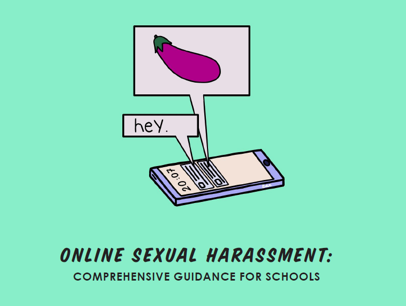Media and Communication at Leicester
Featured projects
Tackling Online Sexual Harassment in Schools
Granting Agency
Research England QR Funding
Research Team
Dr Kaitlynn Mendes (PI), University of Leicester, Professor Jessica Ringrose, University College London (Co-I), Dr Tanya Horeck, Anglia Ruskin University (Co-I), Sexplain (Project Partner)
The aim of this project was to develop a comprehensive guidance for secondary schools on how to tackle the problem of online sexual harassment. Online sexual harassment refers to a range of behaviours where digital technologies are used to facilitate both virtual and face-to-face sexually based harms. Examples of online sexual harassment can be broadly split into the following areas:
- Unsolicited sexual content online refers to any sexual content shared online which is not wanted by the recipient. This could include content seen on apps, messaging services and websites which has not been sought out by the user.
- Image-based sexual abuse refers to the non-consensual creation and/or distribution of sexual images.
- Sexual coercion, threats and intimidation online could include a person receiving threats of a sexual nature or being coerced to engage in sexual behaviours on or offline via digital technologies.
Drawing from interviews with seven safeguarding leads in UK secondary schools and a survey with students aged 13-18, and working in close consultation with key stakeholders and project partners such as Sexplain, Child Exploitation and Online Protection Command (CEOP), and the Association of School and College Leaders (ASCL), the policy details the laws relevant to these issues and provides recommendations for school staff in terms of pastoral care, whole school approach and curriculum content.
We have also provided additional guidance for young people, including links to resources which outline their legal rights, and links to organisations which can help remove sexually explicit images online.
Documenting Digital Feminist Activism: Mapping feminist responses to new media misogyny and rape culture
Granting agency
Arts and Humanities Research Council
Research team
Dr Kaitlynn Mendes (PI), University of Leicester, Professor Jessica Ringrose (Co-I), Institute of Education; Dr Jessalynn Keller (Co-I) University of East Anglia
This project provides one of the first attempts to map and make visible the way misogyny operates in our current cultural climate, and the innovative ways in which girls and women are using participatory digital media as activist tools to network and organise to challenge sexism, misogyny and rape culture.
Three key research questions include: What experiences of harassment, misogyny and rapeculture are girls and women responding to? How are girls and women using digital media technologies to document experiences of sexual violence, harassment, and sexism? And, why are girls and women choosing to mobilize digital media technologies in such a way?
Case studies include Hollaback! (anti-street harassment website); The Everyday Sexism Project (where users post instances of sexism); The Tumblr site Who Needs Feminism (where users create and post signs about why feminism is necessary); Twitter anti-rape culture hashtag communities including #BeenRapedNeverReported, and #CropTopDay
The project will culminate with a ‘living archive’ where we not only deposit interview transcripts and data from the project, but allow the public to post examples of digital feminist activism. This is the first attempt to bring examples of activism together in one space.
Impact of marketing through social media, online games and mobile applications on children's behaviour
Granting agency
European Commission
Research team
Dr Giuseppe Veltri in partnership with LSE, OpenEvidence, Pompeo Fabra University, Bloc de Ideas
Kids are increasingly active in the use of Online Games, Social Media Sites, and Mobile Applications (henceforth simply OGSMMA). The primary overall goal of this study is to “support the Commission with evidence for investigating and understanding the new and dynamic channels of online marketing to children, as well as the measures to alleviate consumer vulnerability among children in relation to sophisticated online marketing”.
In addition, only if justified by the evidence gathered, the study should also “help the Commission in preparing evidence-base proposals for new policy measures”.
More generally, the study shall test and assess the awareness and understanding by children in different age groups of sophisticated marketing techniques directed at them in OGSMMA.
Re-figuring Innovation in Games
Granting agency
Social Sciences and Humanities Research Council of Canada
Research team
Dr Alison Harvey (Co-PI), University of Leicester in partnership with Professor Jennifer Jenson (PI), York University and 20 partners from international universities, gaming companies, gaming collectives, gaming NGOs, and professional associations.
Dr Harvey is co-leading the Formal Education research theme of the project and will be conducting a study of UK-based game design higher education programmes in order to assess how diversity is encouraged or hindered within formal education such as degree and certificate programmes in game design and game studies.
The study aims to make an intervention in how these programmes are promoted and organised to foster more inclusive game design training, through consultation with educators, students, skills bodies, professional associations, policy-makers, and industry representatives.
